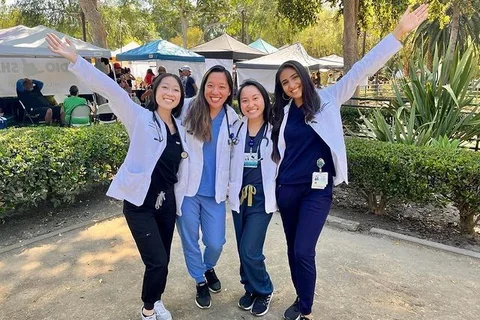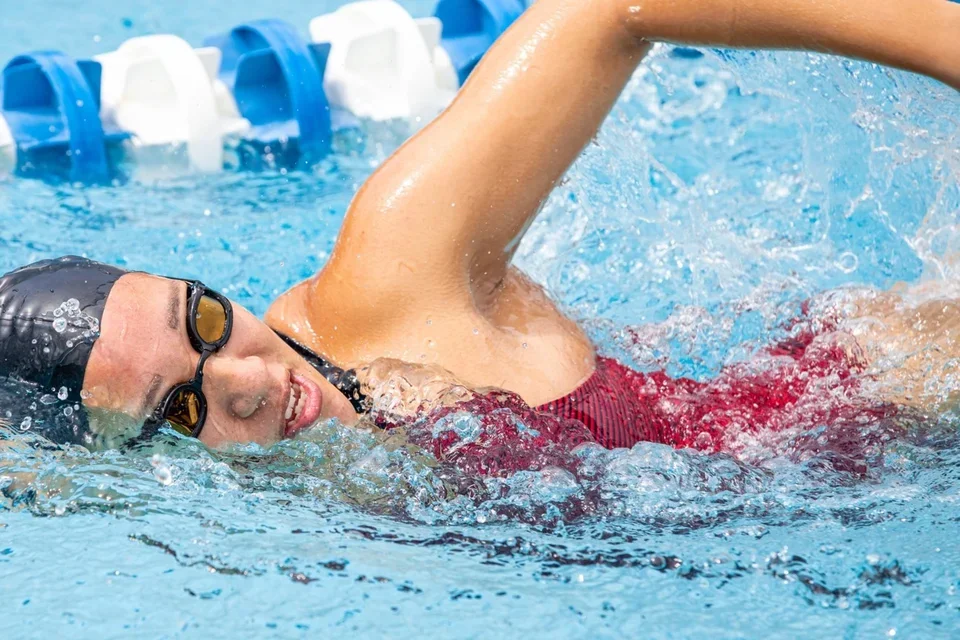Med Student Yifan Mao: Confronting Health Disparities
Student Spotlight

Meet Yifan Mao
Fun Facts
- She’s a champion swimmer
- She speaks fluent Mandarin
- The Japanese Ministry of Foreign Affairs selected her to participate in a cultural exchange program for U.S. collegiate swimmers
Medical student Yifan Mao immigrated to the United States from Sapporo, Japan when she was just four years old. She credits her parents, both physician-scientists, for sparking her initial interest in becoming a doctor.
“I got curious about medicine just by being around them and hearing about their patients and research,” she says.
As a junior in high school, she witnessed devastating health disparities while shadowing physicians in a pediatric intensive care unit (ICU). She’ll never forget seeing a six-year-old boy from rural Oregon come in with uncontrollable spasms, which the doctors traced to tetanus. The boy, who hadn’t been vaccinated, developed the potentially fatal infection after falling off a haystack.
“He was in so much pain from something as commonplace as a fall because he came from an area with minimal healthcare access and health literacy,” Yifan says, recalling how stunned she’d felt by the inequity.
“He had no agency.”
About a year later, health disparities rattled her own family. As immigrants, Yifan’s parents had always faced language, cultural, and healthcare barriers. Those barriers compounded when her mom became sick after the family had temporarily lost health insurance coverage. Her essential hospital stay resulted in financially crippling bills.
“Becoming her caregiver and also seeing what she went through really motivated me,” Yifan says.
More determined than ever to help mitigate disparities as a doctor, Yifan soon began her pre-medical studies at the University of Chicago, where her understanding of systemic inequities would grow exponentially.

From “Seeing” to “Doing”
Yifan began working at an emergency room (ER) during her first year of college.
“I noticed a lot of people would come into the ER for essential primary care services they couldn’t afford otherwise.”
One patient stands out in her memory. He had advanced lung cancer but hadn’t seen a doctor in over twenty years due to prohibitive out-of-pocket medical expenses combined with Chicago’s rising cost of living.
“It was upsetting to see him like that, especially because lung cancer is now very treatable and sometimes even curable,” Yifan says. “And he wasn’t the only one. Multiple patients were suffering in similar ways.”
The following year, she enrolled in an elective course focused on health disparities. The class provided sobering statistics to pair with her ER observations. She learned that in Chicago, the 10 miles between some neighborhoods could add up to a 15-year difference in residents’ life expectancy.
“I’d already seen the effects of health disparities, but the class gave me a deepened understanding of what needed to be done, what could be done, and also what I could do.”
Before the class, she could easily see what was wrong. After the class, she felt like someone who could do something about it.
After graduating from the University of Chicago magna cum laude with a Bachelor of Science (BS) in Biological Sciences with a Specialization in Endocrinology and a Bachelor of Arts (BA) in Neuroscience, she came to the David Geffen School of Medicine at UCLA (DGSOM) to continue her medical education.
“I chose UCLA because everyone seemed genuinely happy here,” Yifan says. “The leadership is clearly invested in our career development, and most importantly, they care deeply about our well-being and mental health.”

Life as a Med Student
As a first-year medical student, Yifan fell in love with anatomy and began considering specializing in surgery.
“I like how fast you can see results with surgery compared to other interventions. You can take someone into the operating room and send them home knowing you’ve made progress,” she says, adding that she also finds the idea of working with her hands appealing.
As someone who likes to stay busy, she finds a surgeon’s characteristically full schedule more inviting than daunting. Her participation in a number of extracurricular activities reflects that preference. She chaired the Asian Pacific American Medical Student Association (APAMSA) community health committee, coordinated the orthopedic and vascular surgery interest groups, served as the Medical Student Council (MSC) well-being committee representative, participated in endocrine surgery research, and also stayed active in her lifelong passion—swimming.
Making Time for a Lifelong Passion
Yifan’s parents signed her up for swimming lessons when she was six years old. She took to the sport immediately, joining a competitive club swimming team within a year of starting lessons and becoming a swim instructor not long after that.
When she approached her college years, the University of Chicago recruited her to swim.
“It’s my passion, so I found ways to balance over 20 hours a week in the pool with my heavy pre-med course load, research, and volunteering.”
She’s still swimming today as a busy medical student. She wasn’t technically planning on it, but when a friend told her about UCLA’s outdoor pools, she couldn’t resist the prospect of swimming under the warm Southern California sun. Soon after she started swimming casually, she realized how much she missed competition and joined the UCLA Club Swim Team.
“I didn't think I would have the time or energy, but it's been great for my mental health,” Yifan says.
“Swimming has always given me a place to clear my head, no matter what’s going on with my life. It helps me relax and recuperate after my clinical duties and also get a good workout.”
Swimming may help Yifan wind down from medical school, but she also trains hard to perfect her form. Her women’s club team placed 13th overall at the College Club Swimming National Championships. Yifan placed 3rd in the 50 freestyle, 11th in the 100 freestyle, and 5th in the 200 freestyle relay along with her teammates.

Swimming and Medicine: Complementary Interests
Swimming and practicing medicine may be vastly different activities, but Yifan believes her two passions intertwine in surprising, yet enriching, ways.
“There are many similarities in medicine and sports. Both require you to be a good team player, work with all kinds of people, and adapt to different teaching styles.”
Furthermore, teaching swimming lessons to under-served kids in Chicago exposed Yifan to additional ways systemic inequities can mean the difference between life and death.
On her first day of teaching, Yifan met a student’s mother who felt nervous, but also relieved, to see her five-year-old son learn how to swim; her own brother had drowned when he was just a young boy.
Like so many Black children at the time, he had been excluded from swimming pools. He’d never had the opportunity to practice basic water safety techniques in a public pool let alone benefit from formal swimming lessons.
“Historically, Black people were excluded from swimming pools,” Yifan says. “That history also excluded them from surviving.”
Later on, the mother sent Yifan a heartfelt thank-you letter. It touched Yifan to know she’d made a difference and also solidified her commitment to teaching others how to swim.
“It's really important for me to be able to pass on my knowledge and skills to the younger generation.”
Expert Advice for Pre-Med Students
Yifan recommends aspiring doctors get involved with research as early as possible, whether that’s in medical school or even during pre-med. Early experience in any field, even areas they don’t end up specializing in, helps build foundational skills. Yifan says her pre-med sickle-cell research was invaluable to her overall development, even if the focus doesn’t directly relate to surgery, her potential specialty.
Participating in endocrine surgery research during medical school has connected her to incredible mentors, exposed her to fascinating scientific inquiry, and even provided her opportunities to present at conferences and publish research papers.
More broadly, she advises pre-med or new medical students to be open-minded about the specialties they’re considering, the experiences and extracurricular activities they engage with, and really, about everything they do throughout medical school.
“I didn't think I would be able to keep swimming, but it's been a huge part of my med-school life so far,” she says. “A few years ago, I didn’t even think about pursuing orthopedic surgery and now it’s one of my biggest interests.”



